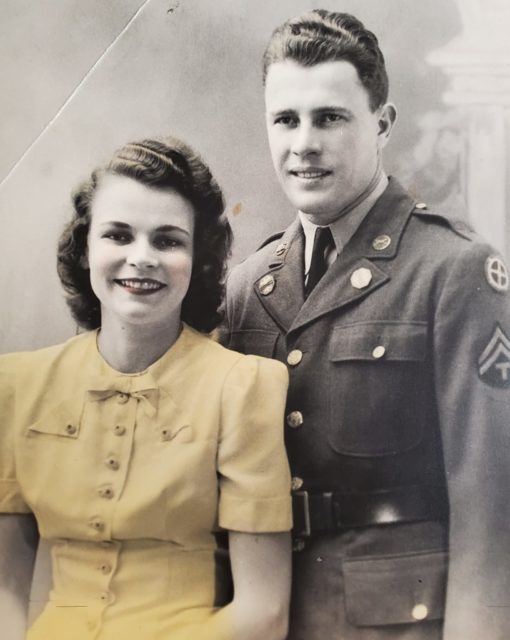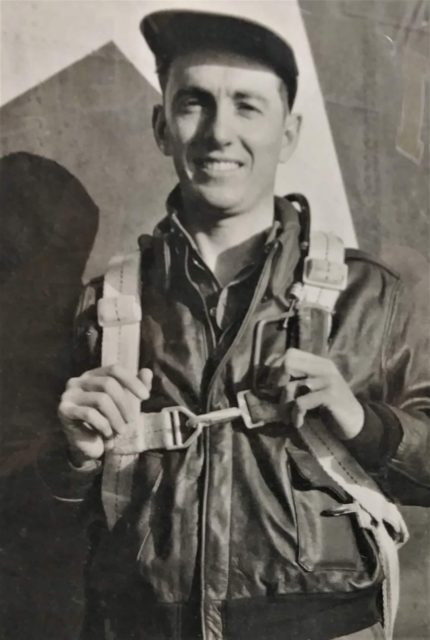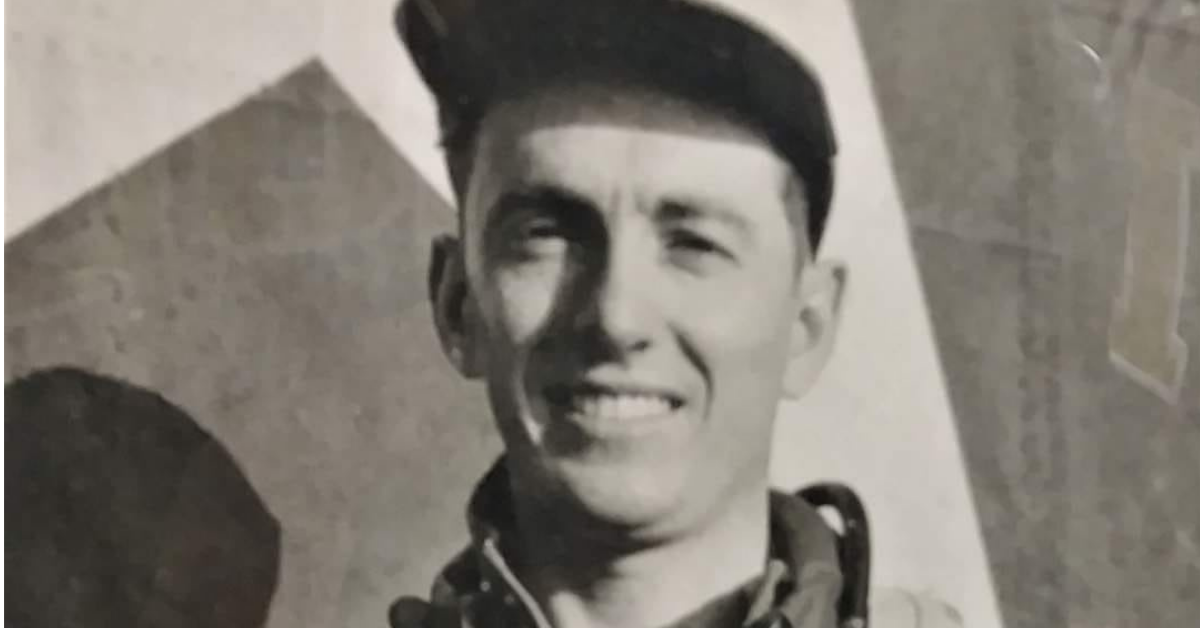Howard Ewing Wyss was raised the last of five children on a small farm near Russellville in Moniteau County, Missouri. Following his graduation from high school in nearby California in 1935, he spent the next few years working a number of jobs as the country strived to recover from the Great Depression.
Howard met his future wife, Berniece Parrish, while the north and south Moniteau County youth gathered at a freshwater spring on Sunday afternoons, explained his son, Mike Wyss. He asked her to a show in California and they soon began dating.
The couple married on December 22, 1940, while Wyss was employed driving a truck for his older brother’s transportation company. At the time, much of their work came with delivering supplies used to build the hundreds of buildings on the developing Fort Leonard Wood.
There was little time to celebrate their new marriage because only two months earlier, the 25-year-old Wyss was mandated to register for the military draft. On February 17, 1941, the Jefferson City Post-Tribune reported that he was among 23 local inductees scheduled to report to “Jefferson Barracks to undergo examinations in preparation for one year’s army training.”
From there, he was assigned to the 35th Division and transferred to Camp Robinson in North Little Rock, Arkansas, for a year of training. Several months later, he decided to pursue a military direction other than infantry when he volunteered to serve in the U.S. Army Air Forces.
“I think he decided if he was going to war, he’d rather be above it all,” said Mike Wyss.

The veteran’s daughter, Nancy Kruse, added, “He was going to become a pilot but failed the test because of his depth perception. That’s when he went on to train as a bombardier on the B-24s,” she added.
The aviation cadet attended Army Air Forces Bombardier School near Big Spring, Texas. Throughout the next several months, he completed a number of ground courses and target missions over a practice area while learning to use technology such as the Norden bombsight — a highly classified instrument that increased bombing target accuracy.
Sadly, on July 28, 1943, Wyss’s older brother Nobel, who was a radio operator aboard a B-17 Flying Fortress, was killed when his aircraft crashed 28 miles south of Fort Morgan, Colorado, while on a training mission. Both Wyss and his wife traveled to Mid-Missouri for the funeral.
Becoming part of the 10-man crew of a B-24 Liberator — a four-engine heavy bomber — Wyss was transferred to the West Coast to participate in patrol missions from locations such as Blythe Army Airfield. Their duties included searching for enemy submarines along the coast between Santa Monica and Santa Barbara. His wife, Berniece, moved to California to be with her husband.
“Sometime later, he left the states with a group of 20 planes and 200 men heading for duty in China,” said Mike Wyss. “On the way over, his plane developed engine troubles and had to land in Cairo, Egypt, for a few days for repairs.” He continued, “While there, they were able to visit the pyramids.”

Nancy Kruse remarked, “When they finally made it to China, our father volunteered for as many missions as possible because once you reached a certain number of missions or flight hours, you were sent back to the states. He wanted to get back home to mom as quickly as possible.”
On a small piece of paper, Wyss wrote that he was stationed near a small town along the southeastern coast of China, from where he and his fellow crewmembers of the 374th Bombardment Group flew a mission in search of Japanese ships. He penned, “We sank seven ships, at least one loaded with Japanese troops.”
Wyss further explained that they did not have the protection of American troops and were soon driven further inland by Japanese forces. They continued flying coastal missions although from a much greater distance.
Nancy Kruse explained, “He was often in the belly turret of the plane and some of these missions might last 10 hours or longer.”
Later in the war, Wyss’s crew was among a group of aircraft sent to bomb Japanese ships in the fortified Takao Harbor in Taiwan. Because of the heavy defenses encountered, they circled from a safe distance while the aircraft in their group were individually dispatched on bombing runs.
“They believed it was too dangerous to send all the planes at once,” said Mike Wyss. “My father was in the ninth of ten planes and, along with the tenth plane, watched as the first eight were shot out of the sky.” Somberly pausing, he added, “Fortunately, he and the final plane survived their bombing run.”
When Wyss returned to the states in late 1945, only two of the 20 planes and 100 of the 200 crewmembers with whom they had traveled overseas remained. Following his discharge, he and his wife moved briefly to Rolla, where the veteran attended college on the GI Bill.
In later years, the couple raised a son and daughter while building a successful meat processing and locker plant in the Russellville community in addition to pursuing other professional endeavors. He remained in the Air Force Reserve, retiring as a major in 1960.
Wyss and his wife have since passed, but his children remarked that it was not until his final years that he chose to share snippets of his military service. For most of his life, he focused his attention on being a father and investing countless hours in earning a decent living to support his family.
More from us: ‘Knack For Fixing Things’ — Veteran Learned Aircraft Repair While Serving In The US Marine Corps
His daughter, Nancy Kruse, commented that the family always thought of their dad and grandfather as a very hardworking and dedicated gentleman; working six days a week from early morning till late evening was the norm. “His faith, courage, wisdom, and work ethic will always be our inspiration,” she said.
Mike Wyss added, “We have a great-grandfather who served in the Civil War and know nothing about his service. For us,” he paused, “it’s about making sure these stories are not forgotten; it’s our family’s story, but also that of so many other families in our great country who have loved ones who served.”
Jeremy P. Ämick writes on behalf of the Silver Star Families of America
